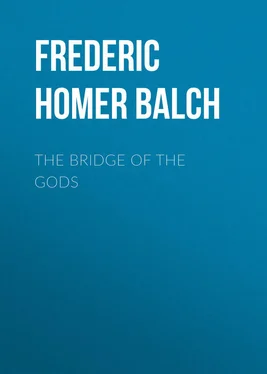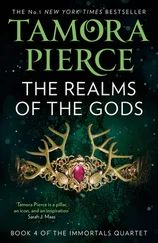Frederic Balch - The Bridge of the Gods
Здесь есть возможность читать онлайн «Frederic Balch - The Bridge of the Gods» — ознакомительный отрывок электронной книги совершенно бесплатно, а после прочтения отрывка купить полную версию. В некоторых случаях можно слушать аудио, скачать через торрент в формате fb2 и присутствует краткое содержание. ISBN: , Жанр: foreign_antique, foreign_prose, на английском языке. Описание произведения, (предисловие) а так же отзывы посетителей доступны на портале библиотеки ЛибКат.
- Название:The Bridge of the Gods
- Автор:
- Жанр:
- Год:неизвестен
- ISBN:http://www.gutenberg.org/ebooks/28815
- Рейтинг книги:3 / 5. Голосов: 1
-
Избранное:Добавить в избранное
- Отзывы:
-
Ваша оценка:
- 60
- 1
- 2
- 3
- 4
- 5
The Bridge of the Gods: краткое содержание, описание и аннотация
Предлагаем к чтению аннотацию, описание, краткое содержание или предисловие (зависит от того, что написал сам автор книги «The Bridge of the Gods»). Если вы не нашли необходимую информацию о книге — напишите в комментариях, мы постараемся отыскать её.
The Bridge of the Gods — читать онлайн ознакомительный отрывок
Ниже представлен текст книги, разбитый по страницам. Система сохранения места последней прочитанной страницы, позволяет с удобством читать онлайн бесплатно книгу «The Bridge of the Gods», без необходимости каждый раз заново искать на чём Вы остановились. Поставьте закладку, и сможете в любой момент перейти на страницу, на которой закончили чтение.
Интервал:
Закладка:
What tall and tawny men were these,
As sombre, silent, as the trees
They moved among! and sad some way
With tempered sadness, ever they,
Yet not with sorrow born of fear,
The shadows of their destinies
They saw approaching year by year,
And murmured not.
They turned to death as to a sleep,
And died with eager hands held out
To reaching hands beyond the deep;
And died with choicest bow at hand,
And quiver full and arrow drawn
For use, when sweet to-morrow’s dawn
Should wake them in the Spirit Land.
BOOK I
THE APOSTLE TO THE INDIANS
CHAPTER I
THE NEW ENGLAND MEETING
One Sabbath morning more than two hundred years ago, the dawn broke clear and beautiful over New England. It was one of those lovely mornings that seem like a benediction, a smile of God upon the earth, so calm are they, so full of unutterable rest and quiet. Over the sea, with its endless line of beach and promontory washed softly by the ocean swells; over the towns of the coast, – Boston and Salem, – already large, giving splendid promise of the future; over the farms and hamlets of the interior, and into the rude clearings where the outer limits of civilization mingled with the primeval forest, came a flood of light as the sun rose above the blue line of eastern sea. And still beyond, across the Alleghanies, into the depth of the wilderness, passed the sweet, calm radiance, as if bearing a gleam of gospel sunshine to the Indians of the forest.
Nowhere did the Sunday seem more peaceful than in a sheltered valley in Massachusetts. Beautiful indeed were the thrifty orchards, the rustic farmhouses, the meadows where the charred stumps that marked the last clearing were festooned with running vines, the fields green with Indian corn, and around all the sweep of hills dark with the ancient wood. Even the grim unpainted meeting-house on the hill, which was wont to look the very personification of the rigid Calvinistic theology preached within it, seemed a little less bare and forbidding on that sweet June Sabbath.
As the hour for morning service drew near, the drummer took his accustomed stand before the church and began to thunder forth his summons, – a summons not unfitting those stern Puritans whose idea of religion was that of a life-long warfare against the world, the flesh, and the devil.
Soon the people began to gather, – grave men and women, dressed in the sober-colored garb of the day, and little children, clad in their “Sunday best,” undergoing the awful process of “going to meeting,” yet some of them, at least, looking at the cool shadowed wood as they passed, and thinking how pleasant it would be to hunt berries or birds’ nests in those sylvan retreats instead of listening to a two hours’ sermon, under imminent danger of perdition if they went to sleep, – for in such seductive guise did the Evil One tempt the souls of these youthful Puritans. Solemn of visage and garb were the groups, although here and there the gleam of a bit of ribbon at the throat of some young maiden, or a bonnet tastefully adorned, showed that “the world, the flesh, and the devil” were not yet wholly subdued among them.
As the audience filed through the open door, the men and women divided, the former taking one side of the house, the latter the other, – the aisle forming a dividing line between them. The floor was uncarpeted, the walls bare, the pulpit undraped, and upon it the hour-glass stood beside the open Bible. Anything more stiff and barren than the interior of the meeting-house it would be difficult to find.
An unwonted stir breaks the silence and solemnity of the waiting congregation, as an official party enters. It is the Governor of the colony and his staff, who are making a tour of the province, and have stopped over Sunday in the little frontier settlement, – for although the Governor is an august man, even he may not presume to travel on the Sabbath in this land of the Puritans. The new-comers are richly dressed. There is something heavy, massive, and splendid in their garb, especially in the Governor’s. He is a stately military-looking man, and wears his ample vestments, his embroidered gloves, his lace and ruffles, with a magisterial air.
A rustle goes through the audience as the distinguished visitors pass up the aisle to the front seats assigned, as the custom was, to dignitaries. Young people steal curious glances at them; children turn around in their seats to stare, provoking divers shakes of the head from their elders, and in one instance the boxing of an ear, at which the culprit sets up a smothered howl, is ignominiously shaken, and sits swelling and choking with indignant grief during the remainder of the service.
At length the drum ceased, indicating both the arrival of the minister and the time for service to begin.
The minister took his place in the pulpit. He was a young man, of delicate mould, with a pale and intellectual face. Exquisite sensitiveness was in the large gray eyes, the white brow, the delicate lips, the long slender fingers; yet will and energy and command were in them all. His was that rare union of extreme sensibility with strong resolution that has given the world its religious leaders, – its Savonarolas and Chrysostoms; men whose nerves shrank at a discord in music, but when inspired by some grand cause, were like steel to suffer and endure.
Something of this was in the minister’s aspect, as he stood before the people that morning. His eyes shone and dilated, and his slight figure gathered dignity as his gaze met that of the assembly. There was no organ, that instrument being deemed a device of the Prince of Darkness to lead the hearts of the unwary off to popery; but the opening hymn was heartily sung. Then came the Scripture reading, – usually a very monotonous performance on the part of Puritan divines; but as given in the young minister’s thoughtfully modulated voice, nothing could have been more expressive. Every word had its meaning, every metaphor was a picture; the whole psalm seemed to breathe with life and power: “Lord, thou hast been our dwelling-place in all generations.”
Majestic, mournful, yet thrilling with deathless hope, was the minister’s voice; and the people were deeply moved. The prayer followed, – not the endless monologue of the average Puritan clergyman, but pointed, significant, full of meaning. Again his face was lifted before them as he rose to announce the text. It was paler now; the eyes were glowing and luminous; the long, expressive fingers were tremulous with excitement. It was evident to all that no common subject was to be introduced, no common effort to be made. Always composed, the audience grew more quiet still. The very children felt the hush of expectation, and gazed wonderingly at the minister. Even that great man, the Governor, lost his air of unbending grandeur, and leaned expectantly forward.
The subject was Paul’s vision of the man in Macedonia crying for help. The speaker portrayed in burning words the condition of Macedonia, the heathen gloom and utter hopelessness of her people, the vision that came to Paul, and his going to preach to them. Then, passing to England under the Druids, he described the dark paganism, the blood-stained altars, the brutal priesthood of the age; and told of the cry that went forth for light, – a cry that touched the heart of the Roman Gregory into sending missionaries to show them the better way.
Like some royal poem was the discourse, as it showed how, through the storms and perils of more than a thousand years, amid the persecution of popes, the wars of barons, and the tyranny of kings, England had kept the torch burning, till in these latter times it had filled the world with light. Beautiful was the tribute he paid to the more recent defenders of the faith, and most intense the interest of the listeners; for men sat there who had come over the seas because of their loyalty to the faith, – old and grizzled men, whose youth had known Cromwell and Charles Stuart, and who had in more recent years fought for “King Monmouth” and shared the dark fortunes of Argyle.
Читать дальшеИнтервал:
Закладка:
Похожие книги на «The Bridge of the Gods»
Представляем Вашему вниманию похожие книги на «The Bridge of the Gods» списком для выбора. Мы отобрали схожую по названию и смыслу литературу в надежде предоставить читателям больше вариантов отыскать новые, интересные, ещё непрочитанные произведения.
Обсуждение, отзывы о книге «The Bridge of the Gods» и просто собственные мнения читателей. Оставьте ваши комментарии, напишите, что Вы думаете о произведении, его смысле или главных героях. Укажите что конкретно понравилось, а что нет, и почему Вы так считаете.












